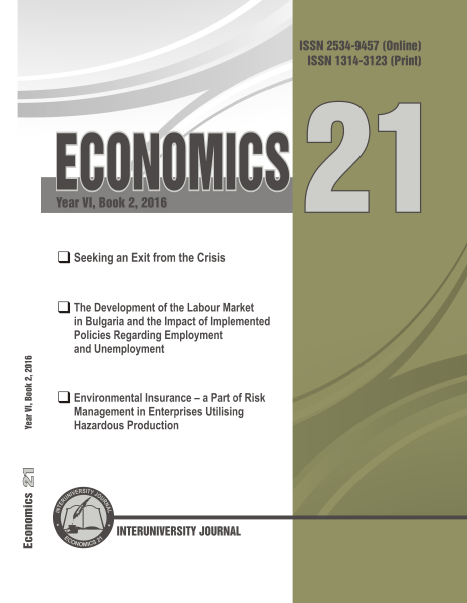THE DEVELOPMENT OF THE LABOUR
MARKET IN BULGARIA
AND THE IMPACT OF IMPLEMENTED
POLICIES REGARDING EMPLOYMENT
AND UNEMPLOYMENT
THE DEVELOPMENT OF THE LABOUR
MARKET IN BULGARIA
AND THE IMPACT OF IMPLEMENTED
POLICIES REGARDING EMPLOYMENT
AND UNEMPLOYMENT
Author(s): Venelin TerzievSubject(s): Economy
Published by: Стопанска академия »Д. А. Ценов«
Keywords: labour market; employment; unemployment; social policies
Summary/Abstract: The adequacy and timeliness of an implemented policy are crucial for the effective support of changes in the parameters of the labour market and economic development. Considering the time delay of the effects and changes. its duration should not be overlooked in order to develop preventive measures for a timely response. Shortening the period in which the effects of the contemporary crisis are transferred on the labour market, respectively labour demand, reflects not only the degree of elasticity of labour demand to primary markets, but also the flexibility of the implemented policies. This fact has focused attention on the flexibility of labour markets and opportunities through its increase to strengthen the mobility and adaptability of the workforce to the dynamically evolving labour demand. Considering the features of economic development and the possible impacts on the labour market is gradually becoming an inseparable part of the policy-making process in the labour market. If, in the early periods of the development of the labour market, policies were aimed primarily at tackling the effects of economic reforms on employment, at a later stage labour market policy has a pronouncedly active character and it is aimed at influencing processes or the formation of behaviour among target groups according to pre-planned targets. The functioning labour market is an adequate mechanism of the market environment and the implemented policy is increasingly based on the existing relationships and interactions between the periods of economic development and the labour market. Regulatory regimes have a certain influence on the development of the basic parameters of the labour market, but overall their impact, and that of the specific policies of the labour market for activation of labour resources, for providing employment and for better labour adaptation of the workforce have effects with limited opportunities towards the balance of labour supply and demand. 22 Economics 21 2/2016 The policy on the labour market in Bulgaria during the transition period so far has reflected in varying degrees the needs of the economy1. In 1990-2000 this policy was built together with the development of the labour market itself and therefore its nature is mainly preventive. After 2000 the policy of the labour market involves more active programmes and activities that reflect more adequately the changes in the macroeconomic environment and the periods in the economic development. Overall, however, the active policy has a minor and a temporary role in supporting employment and cannot replace investment activities to create jobs. Economic development is crucial for supply and demand in the labour market and for its balance in the different periods of development.
Journal: Икономика 21
- Issue Year: 6/2016
- Issue No: 2-ENG
- Page Range: 21-59
- Page Count: 39
- Language: English

